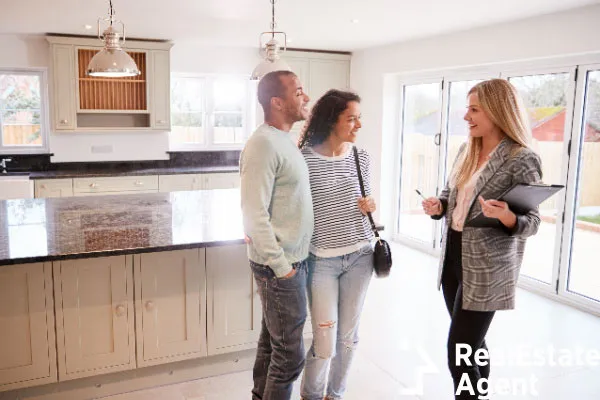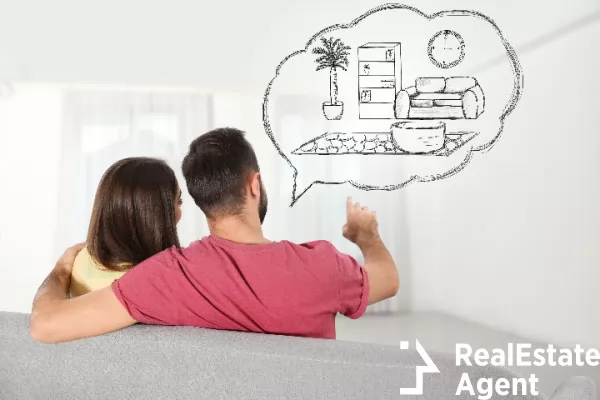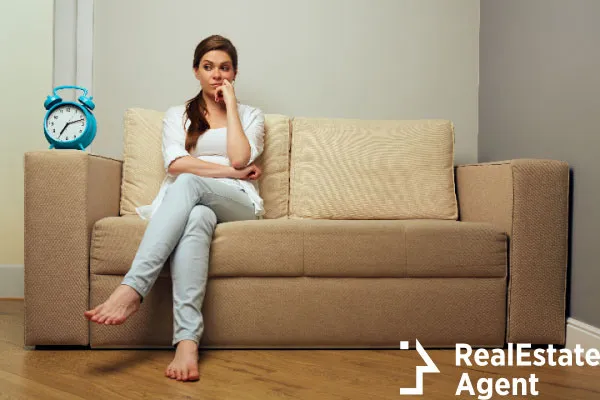 Organizing and attending a house showing can be an intimate and unique experience for both parties. After all, homeowners show a piece of their former personal life to strangers. At the same time, home buyers are offered a glimpse into someone else’s private life together with their personal effects. Also, they should imagine how their lives would look and feel in that home. So, yes, there is a lot at stake at house showings. Since articles on this topic are few and far between, we decided to uncover the unspoken realities surrounding signs a house showing went well.
Organizing and attending a house showing can be an intimate and unique experience for both parties. After all, homeowners show a piece of their former personal life to strangers. At the same time, home buyers are offered a glimpse into someone else’s private life together with their personal effects. Also, they should imagine how their lives would look and feel in that home. So, yes, there is a lot at stake at house showings. Since articles on this topic are few and far between, we decided to uncover the unspoken realities surrounding signs a house showing went well.
Who will answer my house-showing questions?
House showings are paramount in the home-selling process, meaning that a successful display will most definitely impact the sale of a property. Sellers and buyers will ask various questions, such as “How long to get feedback after a house viewing,” “How soon after viewing a house should you make an offer,” or “What happens after a house showing.”
Right off the bat, we recommend you work with established local real estate agents who can address all your inquiries quickly and efficiently. Don’t expose yourself to the pitfalls of working without a realtor!
Staging ideas for home sellers
Expert realtors will assist homeowners in staging their property or recommend a professional home stager to make the most of the process. As a precursor to home presentation, you may also entertain virtual staging, i.e., digitally improving your home’s exterior and interior design to display your home in the most favorable light.
First impressions are gold!
 “You never get a second chance to make a first impression” holds true in property showings. One of the signs a house showing went well is when potential buyers are instantly impressed by the property’s curb appeal. The house exterior is the first point buyers see. Therefore, owners must be cautious to keep it well-maintained, welcoming, and clean.
“You never get a second chance to make a first impression” holds true in property showings. One of the signs a house showing went well is when potential buyers are instantly impressed by the property’s curb appeal. The house exterior is the first point buyers see. Therefore, owners must be cautious to keep it well-maintained, welcoming, and clean.
Consider home exterior remodeling ideas to cement pleasant vibes for the rest of the tour! A manicured lawn, the wonders of arboriculture, and an aesthetically pleasing facade can all contribute to a positive first impression.
Engaged and emotionally connected house buyers
Hosting attentive and engaged potential buyers is one of the unmistakable signs a house showing went well. Did you see them showing enthusiasm during your property presentation? Buyers who ask questions and inquire about specific features of the house while exploring the property are more likely to be genuinely interested. Their fascination indicates that they picture themselves living in the house and consider it a serious option.
How to achieve this? We recommend you start with practical paint jobs to amaze your homebuyers. Plus, you won’t have to fear getting no feedback after house showing!
During your home remodel, try to apply the psychology of light and color in your interior to trigger a mighty emotional response from your buyers. They must be able to picture their family gathering in the spacious living room or imagine themselves cooking in a hip kitchen.
Do they wish to stay longer? Then, you’re on the right track!
 A brief visit indicates a lack of interest and no emotional connection to the house. On the other hand, a more extended stay suggests your buyers are taking the time to thoroughly explore your property. We’re way past the average house showing time (see the details below!)
A brief visit indicates a lack of interest and no emotional connection to the house. On the other hand, a more extended stay suggests your buyers are taking the time to thoroughly explore your property. We’re way past the average house showing time (see the details below!)
Be open to their questions and let them spend time inspecting each room, assessing closet space, and even envisioning updated furniture arrangements. This level of engagement proves a genuine curiosity about your house’s potential. Additionally, it is one of the signs a house showing went well. Now, let’s examine what happens after a house showing?
Are you open to hosting a second house showing?
Don’t be surprised if they request a second showing because they want to take a closer look to confirm their initial impressions. Furthermore, second showings enable buyers to focus on details they might have missed during the first tour. You can expect an offer soon!
What does it mean if they openly compare your house to others?
Suppose prospective buyers compare your home to other properties they've recently visited when you’re around. This is a genuinely positive sign. In other words, your house has become a benchmark for them, and they clearly showcase their interest in the property.
Your property receives positive feedback from the buyer's agent.
The buyer’s agent is an essential and reliable mediator between the seller and the potential buyer. They don’t praise real estate represented by other agents out of the blue. So, suppose the buyer’s agent provides positive feedback after a showing. In that case, it’s one of the extraordinary signs a house showing went well.
Agents can read their clients’ reactions. As a result, their insights offer valuable information about potential buyers’ interests and engagement.
Going into details: visualizing practical touches
 Don’t be taken aback if your buyer starts discussing potential renovation realities, updates, or personal touches they would like to make to the property. In fact, these are encouraging signs, implying they are mentally invested in the place. The fact that they’re already thinking about how to customize it to their likings and needs is one of the apparent signs a house showing went well.
Don’t be taken aback if your buyer starts discussing potential renovation realities, updates, or personal touches they would like to make to the property. In fact, these are encouraging signs, implying they are mentally invested in the place. The fact that they’re already thinking about how to customize it to their likings and needs is one of the apparent signs a house showing went well.
In addition, they may strike up a conversation about the practical aspects of living in the house. They can ask you about local education and schools, shopping centers in your neighborhood, or commuting options. Buyers considering the logistics of their daily routine in the area will likely contemplate, “How soon after viewing a house should you make an offer?”
Follow-up communication can raise your hopes for a fast sale!
One of the most definitive signs a house showing went well is receiving follow-up communication (or even offers) from potential buyers or their agents. Interested buyers are already thinking, “How soon after viewing a house should you make an offer?”
Offers show that the buyers are absolutely impressed with your property to take the next step. Even if an offer doesn’t come immediately, follow-up communication (requesting clarification or additional information) suggests that the buyers are actively considering the property.
How long to get feedback after house viewing?
 Many house hunters might become so excited about the prospects of moving into the new home they wish to discover “how long to get feedback after house viewing” asap.
Many house hunters might become so excited about the prospects of moving into the new home they wish to discover “how long to get feedback after house viewing” asap.
The timeline for receiving feedback can change depending on the local real estate market trends, the seller's responsiveness, and the practices of the seller’s agent. Let’s see the various scenarios!
Which are the three cases for feedback time?
Sometimes, real estate agents can provide immediate feedback after a house viewing. This could be a quick overview of the property’s features, potential issues, and whether the property aligns with the buyer’s requirements. Suppose there were clear signs a house showing went well, and the house practically sold itself. In that case, you can hope for a prompt response. You might receive feedback relatively quickly in a competitive or seller’s real estate market where properties are in high demand.
Regularly, you can expect to receive more detailed feedback within a few days after the viewing. This gives the agent time to compile information from potential buyers who viewed the property on the same day as you did. The feedback might cover the property’s condition, layout, and whether it fits you well.
Thirdly, some sellers might take a week or more, especially if they hope for multiple house hunters, before providing a comprehensive response. It might take longer in a slower or buyer’s market because fewer potential buyers and sellers don’t feel the pressure to offer swift answers.
How soon after viewing a house should you make an offer?
 There is no strict guideline for the inquiry “How long to get feedback after house viewing.” It depends on the circumstances presented below. However, suppose there are obvious signs a house showing went well or you’ve found your dream home. In that case, we suggest not to postpone the offer regardless of the circumstances.
There is no strict guideline for the inquiry “How long to get feedback after house viewing.” It depends on the circumstances presented below. However, suppose there are obvious signs a house showing went well or you’ve found your dream home. In that case, we suggest not to postpone the offer regardless of the circumstances.
How to proceed with your offer in various circumstances?
In the seller’s market, we advise you to move faster with your offer, potentially within a day or two after inspecting the property. On the other hand, in a buyer’s market, with virtually no competition, you dispose of considerably more time to make a decision.
Secondly, suppose the house is in high demand and likely to attract multiple offers. Then, make your offer sooner rather than later to avoid missing out.
Read the homeowner’s body language and intentions! If they are motivated to sell quickly, you might be able to cut a better deal by making an offer sooner. The parties can even try negotiating closing expenses in such cases.
By all means, property conditions have a say in the offer. If the house is in excellent condition and the seller benefitted from the best improvement ideas to sell faster. Then, waiting too long will give the floor to other buyers to swoop in.
What happens when there’s no feedback after house showing?
Only sometimes are there evident signs a house showing went well; sometimes, precisely the opposite ensues. What triggers no feedback after house showing? Sellers can consider the following cases.
Lackluster showings or busy agents? Why sellers don’t receive a response?
First, suppose a potential buyer isn't interested in the seller’s property after viewing it. In that case, they might not feel the need to provide feedback. This could be due to the property not meeting their needs, budget, or preferences. Rarely, one seemingly minor detail obstructs selling a home, for instance, an outdated kitchen or the seller neglecting even the most fundamental bathroom renovations. An alternative can be that the house showing generated minimal impressions on the prospective buyer.
Secondly, real estate agents often have busy schedules. Sometimes they might need more time to provide detailed feedback for every showing they attend.
Unimpressive showings can have a word in getting no feedback after house showing. Buyers might choose to only provide feedback if the seller organizes the showing well. The property simply falls out of grace.
What happens after a house showing?
 Impulsive buying in real estate seldom happens. After the house showing, potential buyers can give their real estate agent feedback about their impressions of the property. This feedback can be valuable for the seller and the agent to estimate the level of interest. Plus, they can identify any potential concerns or improvements that could be made to the property.
Impulsive buying in real estate seldom happens. After the house showing, potential buyers can give their real estate agent feedback about their impressions of the property. This feedback can be valuable for the seller and the agent to estimate the level of interest. Plus, they can identify any potential concerns or improvements that could be made to the property.
The buyer’s agent will communicate with the seller’s agent to address any questions. And then comes the exciting part. Suppose the buyer is sold on purchasing the property. Then, they can submit an offer through their agent. The offer includes details such as the proposed purchase price, terms or conditions, and requested real estate contingencies (like financing and inspections).
Once the offer is accepted, parties will discuss the price.
The ball is now in the seller’s court. The seller’s agent presents the offer to their client, who can reject, accept, or counter it. The owner can refuse the offer for various reasons; for example, the buyer has posed exaggerated demands. Counteroffers determine adjustments to the contingencies, price, or other terms.
Nevertheless, price negotiations won’t stop here. Countered offers will lead to further negotiations between the buyer and the seller’s agent. This process can involve multiple rounds of offers and counteroffers until both parties reach an agreement or decide to move on.
Signing the contract
Once both parties reach the common denominator regarding the price and terms, agents on both sides assist in drafting a sales and purchase agreement or contract. This legally binding document determines the terms of the sale, referring to the purchase price, closing date, contingencies, and any other relevant details.
After the sale agreement gets signed, the buyer typically enters an “escrow” period. During escrow, they perform inspections and obtain financing (if it’s the case.). This phase ensures that the property meets the buyer’s expectations and that the buyer is financially prepared for the purchase. Yet, the buyer and the seller should anticipate other costs to pay when the escrow closes.
On closing day, the parties sign the necessary paperwork. Simultaneously, the buyer transfers the funds, and the seller transfers the property officially to the new owner.
What’s the average house showing time?
There isn’t a standardized average house showing time in the States. The property type, market conditions, location, and preferences of both the buyers and sellers set a property presentation’s duration.
House showings can last between fifteen minutes to an hour or more. Some might be quick walkthroughs, while others involve more in-depth property exploration. In a seller’s market, shorter showing times are scheduled as there could be more prospective buyers. Still, the average house showing time is based entirely on the consent between the two parties.
What is the average time from viewing to offer?
 If sellers are pressed for time, they will be eager to get an offer after showing their house. Is there an average time from viewing to offer, anyway? For starters, it takes around three and a half months (from efficient listing to closing day) to sell a property in the US in 2023. Also, sellers may have to wait less than 45 days to receive an offer after the viewing. Note this timeframe isn’t set in stone!
If sellers are pressed for time, they will be eager to get an offer after showing their house. Is there an average time from viewing to offer, anyway? For starters, it takes around three and a half months (from efficient listing to closing day) to sell a property in the US in 2023. Also, sellers may have to wait less than 45 days to receive an offer after the viewing. Note this timeframe isn’t set in stone!
See which factors play in sellers receiving an offer for their property!
The average time from viewing to offer dramatically depends on numerous factors. First impressions of the initial viewing are crucial. Then, after viewing the property, potential buyers may take some time to research comparable properties in the neighborhood and recent sales in the area. Also, they must consider their financial situation.
Once a buyer is interested in making an offer, they will work with their real estate agent to prepare a formal offer. This includes determining the contingencies, the amount offered, and other terms. The buyer’s real estate agent submits the bid to the seller’s agent or straight to the seller if it’s a for-sale-by-owner (FSBO) situation. This step can happen a few days to a week after the initial viewing.
Conclusion
Many homeowners tend to overlook it, but an impressive house showing is a pivotal step in the home-selling process. For this reason, it would be best for home sellers to address property-related issues first. Secondly, boost their aesthetic appeal and then stage them before showing. They can only hope for signs a house showing went well under the proper circumstances.
The list with telling signs is as follows: positive first impressions, engaged buyers, extended stays, emotional connections, positive feedback from the buyer’s agent, requests for second showings, and discussions about personal touches and practicalities. Moreover, comparisons with other homes-for-sale they inspected, follow-up communication, and offers are all critical indicators of an exemplarily executed house showing in the US real estate market. If sellers recognize these signs, they can gain insights into their property’s true potential and make informed decisions to navigate the entire selling process effectively.
How did your home presentation go? Did you receive any signs a house showing went well? What was the average time from viewing to offer in your case? Our comment section is open for discussion on this complex topic! Please share your thoughts so other buyers and sellers can learn from your experiences! Like and share this article on your social media!
















Have a question or comment?
We're here to help.